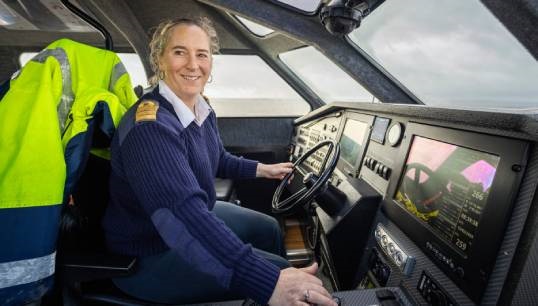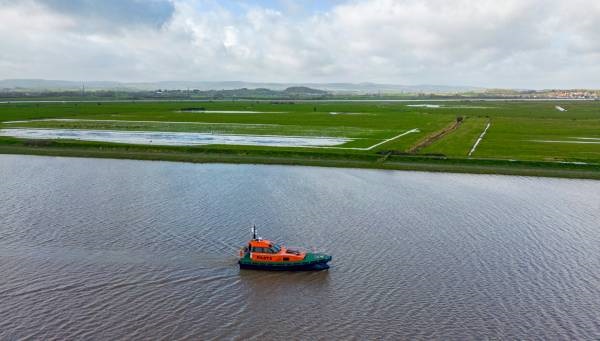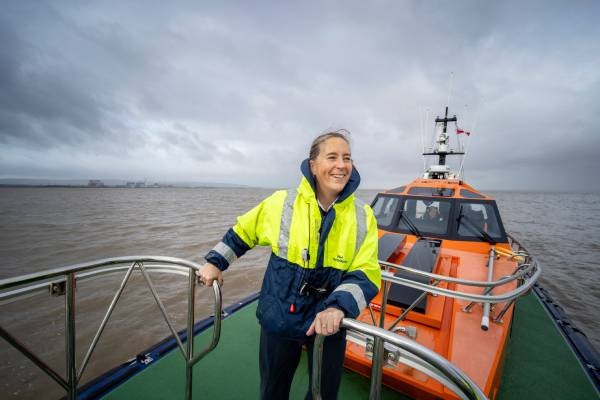- Topics
- Campaigning
- Careers
- Colleges
- Community
- Education and training
- Environment
- Equality
- Federation
- General secretary message
- Government
- Health and safety
- History
- Industrial
- International
- Law
- Members at work
- Nautilus news
- Nautilus partnerships
- Netherlands
- Open days
- Opinion
- Organising
- Podcasts from Nautilus
- Sponsored content
- Switzerland
- Technology
- Ukraine
- United Kingdom
- Welfare

Nautilus Telegraph visited Captain Jessica Tyson at Port of Bridgwater, Burnham on Sea, as part of our planned new YouTube programme highlighting members at work. Interview by Helen Kelly
Captain Jessica Tyson, a marine pilot and acting harbour master, emphasised the importance of local knowledge and adaptability in challenging situations, and highlighted the value of paying it forward and explaining the challenges of the maritime industry to newcomers.
The Port of Bridgwater, located in Somerset, England, plays an important role in facilitating shipping and commerce. However, as pilot and acting harbour master Captain Jessica Tyson explains, the port has some unique characteristics that present interesting challenges in its operations.
Despite covering over 25 square miles of river jurisdiction, the Port of Bridgwater Harbour Authority does not own any of the wharfs or docks, which are all owned and operated by private entities. The harbour authority is focused on providing a safe navigational passage rather than directly driving commercial business. This arrangement requires close cooperation with diverse stakeholders to bring in more shipping traffic.
For example, until recently, one dock owner hosted an aggregate dredger. However, a change in the company’s business operations led to the loss of this regular visitor. The port authority is now exploring options to attract alternative cargo carriers.
Another major user is the Hinkley Point C nuclear power station, which relies on the port for transporting equipment in Abnormal Indivisible Loads upriver by ship since construction began in 2017.
For navigating vessels safely into the port, the Port of Bridgwater employs marine pilots familiar with the local conditions. Pilots come from varied backgrounds, without necessarily having served as a ship's master, though such experience remains valuable. More important is intimate knowledge of the shifting tides, currents, depths and hazards in the port's jurisdiction.
The pilots must also think creatively to deal with potential emergencies. Much of the port dries out at low tide, leaving vessels grounded if tidal changes are misjudged. Their work is made more complex by the port's environmentally sensitive setting within an Area of Outstanding Natural Beauty. Close cooperation with regulatory agencies is needed to balance shipping needs with conservation.
The day we visited, Capt Tyson took us out on the newbuild Goodchild Marine pilot boat, which she researched and invested in on behalf of the harbour authority. Built in the UK, the purpose-built 12m vessel is designed to make sure that pilots can move quickly and effectively in any conditions. The vessel handled beautifully both out in the Bristol channel beyond the harbour limits as well as along the river network.
Capt Tyson clearly enjoys being on the water and loves the pilot boat. According to her, one of the best things about the super-speedy, bright orange vessel is that it not only has all the mod cons and is well heated, but also has a working loo onboard! Sometimes it’s the little comforts that really count.
Drawing on experience
The day-to-day responsibilities of an acting harbour master like Capt Tyson involve both office tasks and hands-on duties. Paperwork, tide monitoring, regulatory compliance and stakeholder engagement feature alongside vessel inspections and maintenance. A 'jack of all trades' approach is necessary, she says.
Capt Tyson also draws on decades of experience at sea, having started as an oil tanker cadet before working in cruise ships, salvage, and among other things, superyacht sea trials.

She spent about a year in Trinidad, which she loved, as well as Costa Rica and India. On her very first trip in the early 1990s, she sailed north of Vladivostok, eastern Russia, for Christmas. 'It was very cold at about minus 15 degrees Celsius and we had come from Singapore, which was about 28 degrees. We didn't have much else other than duffle coats, so we had a lot of layers on, and you go outside for about half an hour before you must come back inside again.'
That first trip was memorable in several ways. While in Vladivostok, the crew were not allowed to disembark the vessel, even to read the draughts of the ship, without documentation – and there was a Russian soldier with a rifle standing at the bottom of the gangway to enforce that rule.
The maritime industry is working 365 days a year. It doesn't stop. People tend to forget that shipping is facilitating their lives. It's a very invisible workforce and it can be very easy to give up too quickly Captain Jessica Tyson
Building resilience
Among the highs have been some pretty challenging lows at sea, says Capt Tyson. There was one trip where the onboard dynamic was so dysfunctional she nearly gave up. 'I told my mother and she said "No, go back and finish (the rotation) because you've only got four months to go". I could have given up right then, but I didn't, and the next job I had was the best trip ever, with the funniest people I'd met in a long time.'
Capt Tyson says she learned a lot from that experience. 'The maritime industry is working 365 days a year. It doesn't stop. People tend to forget that shipping is facilitating their lives.
'It's a very invisible workforce and it can be very easy to give up too quickly.
'I think it's important for anybody who's been to sea, for all of us, just to pay it forward and help the next generation of seafarers to achieve their best.'

Having someone or a network of people to rely on, including formal or informal mentoring, can be invaluable, Capt Tyson says. Nautilus members can find a mentor either through the Union's Sea to City initiative, or through many marine-orientated societies.
Capt Tyson's journey, from almost abandoning the industry to finding renewed purpose through maritime networks and personal relationships, shows what can be achieved when experience and hard work are valued. In 2019 she received the Merchant Navy Medal for service to the maritime industry and has served as a Nautilus Council member and chair of the Women's Forum, which is now part of the Equality and Diversity Forum, for many years.
On International Women's Day 2024, Capt Tyson was named as a mentor for a new initiative to help empower female Merchant Navy cadets by WISTA UK and the Maritime Educational Foundation (MEF). The MEF will fully fund Merchant Navy cadet training for five young women and girls chosen by a panel of WISTA UK members and former Merchant Navy officers, who will also provide successful applicants with mentoring and career guidance.
If you would like us to visit you at your place of work, get in touch. Nautilus loves to showcase the work that our members do. Email us at telegraph@nautilusint.org
Tags
